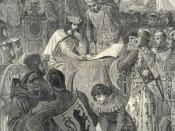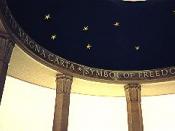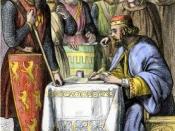Danny Danziger and John Gillingham. 1215 The year Magna Carta. New York: Hodder & Stoughton general division, 2004 During the year of 1215, King John unwillingly signed the Magna Carta, a document fundamental to our concept of democracy. The Year of Magna Carta is an adventurous story of living during that time. It tells an exciting story of the Magna Carta, which begins in 1199 with John's lust for Isabelle, certainly under 15-years-old and possibly younger than that. That marriage resulted in a war that cost John his French possessions. Modern historians think the destruction of the Anglo-Norman is okay since it gave us England and France to study, but back then, nobody in England was much amused. His obsessive shenanigans with Isabelle that cost John an empire reveal his disregards.
Danziger and Gillingham the authors of the book, don't overdo Isabelle's story, but they do expose John's character for what it was, a beast.
A 20th century myth argues that the Magna Carta arises from a revolt by greedy, self-interested barons, which somehow makes it less relevant. Drawing on data from both history and archaeology, Danziger and Gillingham mount a furious attack on this silliness. Danziger and Gillingham organize their book around the various clauses of the Magna Carta, a technique that demonstrates the entire country's disillusionment with John. They start with the Englishman's castle, the aristocratic home, and go on to look at the organization of the countryside, the town, the school, and the family. They turn to war and war games, to the organization and administration of the forests, to the church, the bureaucracy, the courts, and to England's relations with the wider world. Their analysis reveals the popular culture of those days and slays many mythical dragons along the way. The...


